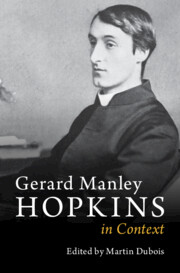Book contents
- Gerard Manley Hopkins in Context
- Gerard Manley Hopkins in Context
- Copyright page
- Contents
- Illustrations
- Notes on Contributors
- Note on Editions and Abbreviations
- Chronology
- Introduction
- Part I Places
- Part II Aesthetic and Cultural Contexts
- Part III Religious, Theological, and Philosophical Contexts
- Part IV Nature, Science, and the Environment
- Part V Gender, Sexuality, and the Body
- Chapter 21 Queerness and Homosociality
- Chapter 22 Masculinity and the Labouring Body
- Chapter 23 Femininity and Martyrdom
- Chapter 24 Eroticism
- Part VI Form, Genre, and Poetics
- Part VII Reception and Influence
- Further Reading
- Index
Chapter 22 - Masculinity and the Labouring Body
from Part V - Gender, Sexuality, and the Body
Published online by Cambridge University Press: 16 January 2025
- Gerard Manley Hopkins in Context
- Gerard Manley Hopkins in Context
- Copyright page
- Contents
- Illustrations
- Notes on Contributors
- Note on Editions and Abbreviations
- Chronology
- Introduction
- Part I Places
- Part II Aesthetic and Cultural Contexts
- Part III Religious, Theological, and Philosophical Contexts
- Part IV Nature, Science, and the Environment
- Part V Gender, Sexuality, and the Body
- Chapter 21 Queerness and Homosociality
- Chapter 22 Masculinity and the Labouring Body
- Chapter 23 Femininity and Martyrdom
- Chapter 24 Eroticism
- Part VI Form, Genre, and Poetics
- Part VII Reception and Influence
- Further Reading
- Index
Summary
This chapter considers the relationship between masculinity, work, and the body in Hopkins’s poetry, focussing in particular on the idealization of working-class bodies in ‘Felix Randal’, ‘Harry Ploughman’, and ‘Tom’s Garland’. It explores Hopkins’s engagement with the ‘Gospel of Work’ in the nineteenth century, situating his works alongside that of writers such as John Ruskin and Thomas Carlyle. It also examines the significance of broader social developments in the period: the rise of ‘muscular Christianity’, the socialist unrest of the late 1880s, and increasing medical concerns about overwork and leisure. The final section turns to Hopkins’s journals to consider his preoccupation with forms of productive labour, especially as this relates to self-regulation and sexual continence. In closing, the chapter considers Hopkins’s fraught engagement with the poetry of Walt Whitman and its eroticized representations of the male body.
Keywords
- Type
- Chapter
- Information
- Gerard Manley Hopkins in Context , pp. 193 - 201Publisher: Cambridge University PressPrint publication year: 2025

